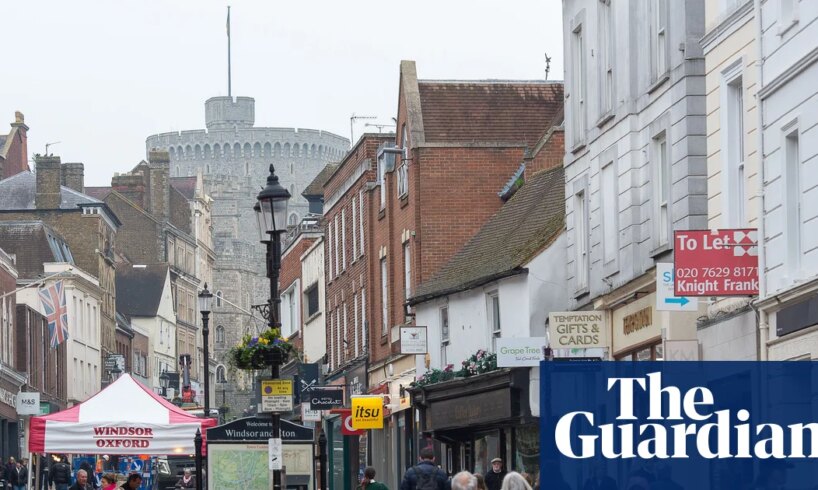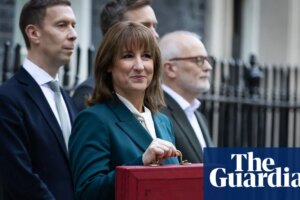
Retailers have breathed a sigh of relief after changes to their business rates bills in the budget were not as bad as feared, after the industry had warned for months that more punitive measures could lead to shop closures and jobs losses.
The chancellor, Rachel Reeves, on Wednesday revealed plans to permanently reduce business rates for retail, hospitality and leisure properties – although the discounts are not as generous as those that have been in place since the pandemic. About 750,000 properties in those sectors will see their bills set below the current standard level, with deeper discounts for smaller operators, according to the government.
Businesses are still calculating what their ultimate bills will be, but the global tax firm Ryan calculated that there are 3,480 retail properties in England that have the higher rateable value and together would pay an extra £112m in business rates from April 2026. However, the government is providing billions of pounds of “transitional relief” to help those whose bills will increase dramatically next year.
Jitters over the government’s final decision had led the British Retail Consortium (BRC), which represents most big retailers, to warn in September that a large rise in bills could lead 400 big stores to close and put as many as 100,000 jobs at risk.
However, reacting to the budget on Wednesday, the chief executive of Sainsbury’s said “industry concerns have been heard”.
“We all want to see inflation and the cost of living come down,” said Simon Roberts. “We welcome the government’s decisions in the budget on business rates, and that industry concerns have been heard. We have been working tirelessly to manage rising costs, and today’s measures mean we can continue tackling inflation and providing great value, quality and service for our customers.”
Those in buildings with a rateable value of more than £500,000 will pay an additional surcharge, although the charge will only be about a quarter of the level originally feared. Many retailers and hospitality businesses will also see the charge offset by deflation in the value of many of their properties, as well as the use of a lower “multiplier” figure which is used to calculate business rates.
Analysts at Citi said they had predicted that the business rates changes could cost Sainsbury’s as much as £39m more, and Tesco £100m, but the chancellor’s announcement meant “that headwind is likely to be materially lower than we had expected”.
George Weston, the chief executive of Primark owner Associated British Foods, said: “The net impact of the business rates reforms to Primark is positive, but we are disappointed that larger, anchor stores that drive so much activity in high streets and local communities are not exempted from the higher rate for large properties.
“We recognise that the government is operating in a difficult environment. Looking ahead, however, we now need to see more action to raise real living standards, drive growth and to reduce the cost of doing business to encourage companies to invest in the UK.”
The BRC chief executive, Helen Dickinson, said it was a “mixed-bag budget” that offered relief for many shops, but brought in new costs for others.
“Retailers face a delicate balancing act as they strive to invest, hire, and keep prices affordable. The announced permanent reduction in retail business rates is an important step to reduce the industry’s burden from this broken tax. Yet the decision to include larger retail premises in the new surtax does little to support retail investment and job creation.”
But the business rates changes have stoked frustration beyond the retail industry.
Kate Nicholls, the chair of UKHospitality, which represents thousands of restaurants, pubs and cafes, said: “Wage rises, holiday taxes and monumental increases in [property values used to calculate rates] have put even further pressure on hospitality businesses as a result of this budget.”
Business lobby group the CBI said the budget overall signalled the government’s growth mission was stalled.
Rain Newton-Smith, the CBI chief executive, said: “A scatter-gun approach to tax risks leaving the economy stuck in neutral.”
The City welcomed the chancellor’s decision to introduce a three-year stamp duty holiday on the purchase of shares in companies listing in the UK.
Dame Julia Hoggett, chief executive of London Stock Exchange, said the move was “a clear acknowledgment of the vital role equity markets play in driving investment, innovation and job creation. It is also an important first step in removing the distorting effects of this duty, which has historically disincentivised investment in UK companies, especially for retail investors.”





